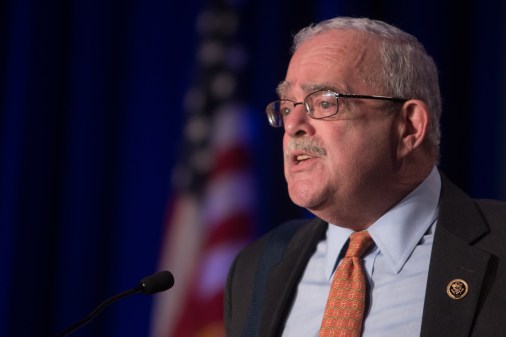Even as the Federal Information Technology Acquisition Reform Act makes its way to the Senate floor, experts are split on whether the bill goes far enough and if legislation is needed at all to fix government’s IT acquisition problems.
Angela Styles, chair of Crowell & Moring’s government contracts group, said a bulky procurement process for industry often drives the private sector away from even giving the government options in what it purchases.
“These companies that come to us and ask ‘What does it mean to be a federal contractor?’ come with the expectation based on FASA ( the Federal Acquisition Streamlining Act) and FARA (the Federal Acquisition Reform Act) from the 90s that the government has an idea how to contract in a commercial fashion. Maybe the changes in ’94 and ’95 were more commercial, but they are not now,” Styles said, speaking Tuesday during a panel session at Amazon Web Services’ annual symposium for federal IT reform.
Styles said the provisions set up in part 12 of the Federal Acquisition Regulation contribute to an “extraordinary gulf” between how the government and private sector do business.
“So many companies that come to us, they assess the risk of doing business with the federal government and they walk away,” she said. “They say ‘You know what, it’s just not worth it.’”
Styles said a solution to closing the gap can come from flexibilities in underutilized provisions.
“You could put a lot of things in place that would make companies feel a lot more comfortable with doing business with the federal government just based on the terms and conditions alone,” she said. “I think the vast majority of the changes needed could actually be done without legislation.”
That mirrors the opinion of federal CIO Steven VanRoekel, who also doesn’t believe legislation is necessary.
“I think the increasing pressure on the role that technology is playing is going to take us — with good management practices [and] with good policy — in the right direction of where we need to go. So I don’t think legislation is necessarily required to get there,” VanRoekel said in an online chat with Federal News Radio last week.
Aaron Wasserman, a legislative assistant for Rep. Derek Kilmer, D-Wash., pointed to the Defense Information Systems Agency’s difficulties in procuring IT solutions due to security and other regulatory issues.
“The government’s creating a government solution. That’s not good. That violates the basic tenant of commercial acquisition,” Wasserman said. “DISA is saying they are very concerned with the fact that the commercial sector can’t provide the security they need. Looking at DOD’s neighbor in the intelligence community, the CIA, we understand they can, and they can do a decent job at it.”
Kilmer, along with Rep. Nikki Tsongas, D-Mass., introduced the DOD Cloud Security Act, which would force DOD to re-examine its cloud security requirements. Some of the language from the DOD Cloud Security Act made its way into the 2015 Defense Appropriations Bill, which called for a report from DOD on cloud computing cost and capabilities. That report is due Sept. 30, 2015.
“We really do take DOD on its word that they want to save money on it, they want to maintain capabilities,” Wasserman said. “But if [DOD is] going to compare the private sector’s ability to provide requirements based on cost and capability and they can’t define what the private sector has in terms of cost and capability — and they disadvantage the private sector based on cost — how can the private sector win in that regard? We would like the department to just take a step back and evaluate where they are and come back and see how we can help them.”
Richard Beutel, a senior adviser for the House Committee on Oversight and Government Reform, said FITARA at least gives CIOs a seat at the table to streamline the decision-making process.
“When you have agencies that have 47 chief information officers, I don’t see how it’s possible — particularly with strong components and large federated agencies — to rationalize your portfolio across the enterprise, particularly with respect to commodity IT and back-office functions. We need to do something to streamline the system and FITARA does that,” Beutel says.
Beutel sees agencies moving to the cloud as a huge way for the government to save billions. He said that of the $81 billion the federal government spends on IT, 70 percent of that is spent on legacy system upkeep.
“How long should the government maintain obsolete mainframe-based systems written in COBOL or MUMPS?,” Beutel said. “I don’t even know if they teach COBOL anymore.”
Kevin Cummins, a legislative assistant for Sen. Tom Udall, D- N.M., said FITARA can help, but only so much.
“Legislation is a very blunt tool,” Cummins said. “The goal of FITARA is empowering people to go out there and get the savings.”





